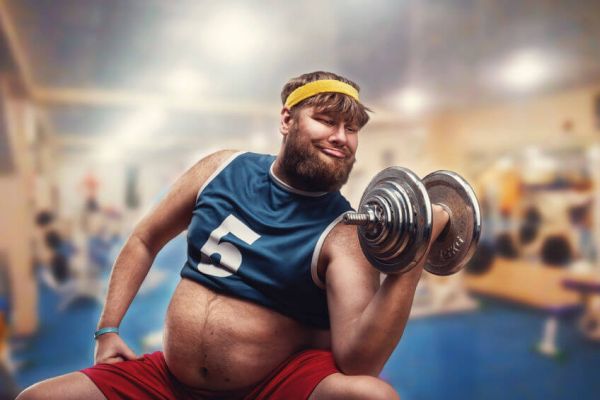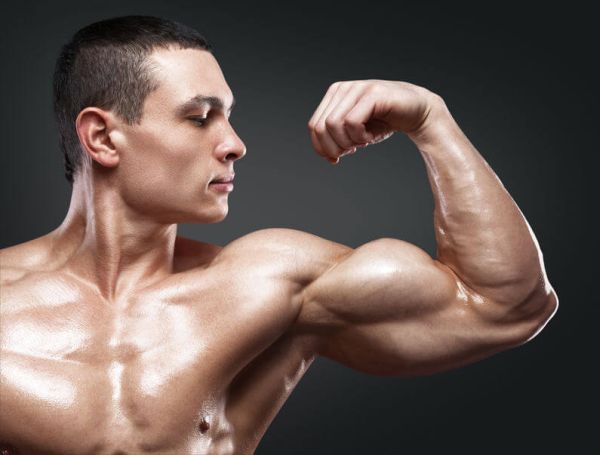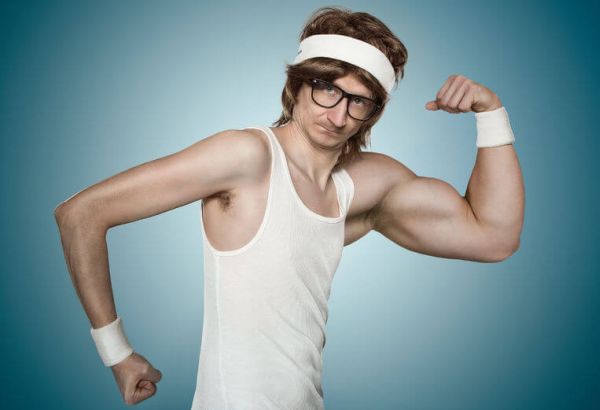Alcohol and its relation to health and fitness is a tricky subject.
In small amounts—a drink or two a day—it has potential health benefits like improved insulin sensitivity, cardiac function, and blood lipids (fatty substances in your blood, which when lowered, reduces your risk of heart disease).
In larger amounts, alcohol leads to barely conscious drives home, fistfights over who’s the best NFL rusher of all time, and charges of public indecency. And to nobody’s surprise, chronic alcohol abuse basically just breaks your ass.
But this chapter isn’t about the various effects of mild or severe drinking.
Instead, it will answer a question on many people’s minds: how much alcohol can we drink before it will negatively affect our weight loss and muscle growth?
Alcohol and Weight Loss

Similar to the carbohydrate inquisition that’s in vogue these days, alcohol is the target of many criticisms. According to some people, if you drink, you’re going to get fat—end of story. And you might just lose all your muscle as a bonus.
Well, if we take a quick look at epidemiological research, we can see that moderate alcohol consumption is actually associated with lower body weight, not higher.
For instance, a study published in 1985 in the American Journal of Clinical Nutrition looked at the diets of 1,944 adults aged 18-74. Researchers found that an increase in calories from ethanol (alcohol) alone didn’t result in the weight gain that would normally occur if those calories were from protein, carbs, or fat.
In fact, thanks to regular alcohol intake, drinkers took in an average of 16% more calories each day than non-drinkers, and had the same levels of physical activity, but weren’t any fatter than their alcohol-free counterparts.
Another study with obese women on a weight loss diet had one group get 10% of daily calories from white wine, and another from grape juice. The result: after 3 months, the white wine group lost about 2 pounds more than the grape juice group.
The exact mechanisms at work aren’t totally clear. A likely factor is drinking can reduce your appetite for food, but it may also be related to its effects on insulin sensitivity.
Now, while it may seem like I’m encouraging you to drink to get shredded, I’m not. Alcohol consumption actually can hinder your weight loss efforts, but in an indirect way.
While alcohol itself basically can’t be stored as body fat, it blocks fat oxidation, which in turn accelerates the rate at which your body stores dietary fat as body fat.
In short, it’s not the calories from alcohol that can make you fat, but all the crap that you eat with it, which is hard to resist when you’re hammered.
So, if you want to be able to drink while dieting and still lose weight, don’t drink more than one day per week, and use the following tips to protect yourself from excess fat storage:
- Restrict your dietary fat intake that day, and don’t eat any fatty foods while you’re drinking.
- Get the vast majority of your calories from protein and carbs that day (with most coming from protein).
- Stay away from carb-laden drinks like beer and fruity stuff. Dry wines are a good choice, as well as spirits.
By following these advices, you can enjoy a few drinks every week without having to feel guilty, and without ruining your weight loss regimen.
Alcohol and Testosterone Levels

Alcohol is going to have to face the music here. It does suppress testosterone levels, but the magnitude of this effect varies.
For instance, a study conducted by the TNO Nutrition and Food Research Institute had 10 men drink 30-40 grams of alcohol per day (2-3 beers or ounces of liquor, or 10-15 ounces of wine). After 3 weeks, their testosterone levels had dropped by about 7% (pretty insignificant).
Another study had 9 men drink 60-70 grams of alcohol after working out, and it had no effects on testosterone levels during the following 5 hours.
What happens when we increase the post-workout dose, though?
The University of Helsinki conducted a similar study, administering 1.5 g ethanol per kg of body weight (!) to 8 healthy men aged 20-26, and found that their testosterone levels dropped by 23% on average between the 10th and 16th hour after they started drinking. Furthermore, cortisol levels were elevated by 36% on average, and growth hormone secretion was heavily suppressed.
Another study conducted by the same university agreed: post-workout binge drinking is bad for testosterone production, proving that 10 beers is a poor post-workout meal (awwww shucks).
So, all things considered, if you have a few drinks here and there, you probably have nothing to worry about in terms of testosterone levels. But doing post-workout protein shots? Not a good idea.
Alcohol and Muscle Recovery and Performance

In rat and in vitro studies, alcohol impairs protein synthesis. Some people directly apply that type of research to living, breathing humans and say it prevents you from building muscle and accelerates muscle loss.
Well, it doesn’t work like that. Rats and humans have major metabolic differences, and in vitro findings don’t always pan out in vivo.
In live humans, muscle-wasting effects of alcohol have only been seen in chronic alcoholics. If you have 7+ drinks per day, you’re going to have trouble building muscle. And walking. And remembering your name.
It’s also commonly claimed that alcohol consumption impairs strength and interferes with the body’s ability to repair muscle damage.
According to studies conducted by the University of Massachusetts and Aarhus University, however, alcohol has no effect on strength or indicators of exercise-induced muscle damage.
On the other hand, a study conducted by Massey University showed that 1 g of ethanol per kg of body weight after exercise magnified post-workout muscle damage. It should be noted, however, that the workout regimen used was a bit ridiculous (300 eccentric contractions on a machine for training the legs), so we can’t be sure its findings apply to more traditional, lower-volume weightlifting workouts.
To Drink or Not to Drink?

Alcohol advocates like to talk it up as some kind of superfood, but the bottom line is it’s not necessary in any way for good health, and it won’t give you any performance benefits.
If you’re like me and don’t drink, I don’t really see any reason for us to start. If you drink regularly, you have a lot more to worry about than interfering with muscle gainz.
But if you drink infrequently and moderately enough to not notice any after effects (no hangovers or lingering issues), then you probably don’t have any good reason to give it up altogether.
What’s your take on drinking and staying fit? Do you abstain completely or keep it moderate? Let me know in the comments below!
Scientific References +
- Barnes MJ, Mündel T, Stannard SR. Post-exercise alcohol ingestion exacerbates eccentric-exercise induced losses in performance. Eur J Appl Physiol. 2010;108(5):1009-1014. doi:10.1007/s00421-009-1311-3
- Poulsen MB, Jakobsen J, Aagaard NK, Andersen H. Motor performance during and following acute alcohol intoxication in healthy non-alcoholic subjects. Eur J Appl Physiol. 2007;101(4):513-523. doi:10.1007/s00421-007-0511-y
- Clarkson PM, Reichsman F. The effect of ethanol on exercise-induced muscle damage. J Stud Alcohol. 1990;51(1):19-23. doi:10.15288/jsa.1990.51.19
- Preedy VR, Paice A, Mantle D, Dhillon AS, Palmer TN, Peters TJ. Alcoholic myopathy: biochemical mechanisms. Drug Alcohol Depend. 2001;63(3):199-205. doi:10.1016/s0376-8716(00)00219-2
- Hong-Brown LQ, Frost RA, Lang CH. Alcohol impairs protein synthesis and degradation in cultured skeletal muscle cells. Alcohol Clin Exp Res. 2001;25(9):1373-1382. doi:10.1111/j.1530-0277.2001.tb02361.x
- Preedy VR, Keating JW, Peters TJ. The acute effects of ethanol and acetaldehyde on rates of protein synthesis in type I and type II fibre-rich skeletal muscles of the rat. Alcohol Alcohol. 1992;27(3):241-251. http://www.ncbi.nlm.nih.gov/pubmed/1449559. Accessed November 2, 2019.
- Heikkonen E, Ylikahri R, Roine R, Välimäki M, Härkönen M, Salaspuro M. The combined effect of alcohol and physical exercise on serum testosterone, luteinizing hormone, and cortisol in males. Alcohol Clin Exp Res. 1996;20(4):711-716. doi:10.1111/j.1530-0277.1996.tb01676.x
- Välimäki M, Tuominen JA, Huhtaniemi I, Ylikahri R. The pulsatile secretion of gonadotropins and growth hormone, and the biological activity of luteinizing hormone in men acutely intoxicated with ethanol. Alcohol Clin Exp Res. 1990;14(6):928-931. doi:10.1111/j.1530-0277.1990.tb01840.x
- Koziris LP, Kraemer WJ, Gordon SE, Incledon T, Knuttgen HG. Effect of acute postexercise ethanol intoxication on the neuroendocrine response to resistance exercise. J Appl Physiol. 2000;88(1):165-172. doi:10.1152/jappl.2000.88.1.165
- Sierksma A, Sarkola T, Eriksson CJP, van der Gaag MS, Grobbee DE, Hendriks HFJ. Effect of moderate alcohol consumption on plasma dehydroepiandrosterone sulfate, testosterone, and estradiol levels in middle-aged men and postmenopausal women: a diet-controlled intervention study. Alcohol Clin Exp Res. 2004;28(5):780-785. doi:10.1097/01.alc.0000125356.70824.81
- Alcohol and the Male Reproductive System. https://pubs.niaaa.nih.gov/publications/arh25-4/282-287.htm. Accessed November 2, 2019.
- Shelmet JJ, Reichard GA, Skutches CL, Hoeldtke RD, Owen OE, Boden G. Ethanol causes acute inhibition of carbohydrate, fat, and protein oxidation and insulin resistance. J Clin Invest. 1988;81(4):1137-1145. doi:10.1172/JCI113428
- Siler SQ, Neese RA, Hellerstein MK. De novo lipogenesis, lipid kinetics, and whole-body lipid balances in humans after acute alcohol consumption. Am J Clin Nutr. 1999;70(5):928-936. doi:10.1093/ajcn/70.5.928
- McCarty MF. Does regular ethanol consumption promote insulin sensitivity and leanness by stimulating AMP-activated protein kinase? Med Hypotheses. 2001;57(3):405-407. doi:10.1054/mehy.2001.1404
- Kokavec A. Is decreased appetite for food a physiological consequence of alcohol consumption? Appetite. 2008;51(2):233-243. doi:10.1016/j.appet.2008.03.011
- Flechtner-Mors M, Biesalski HK, Jenkinson CP, Adler G, Ditschuneit HH. Effects of moderate consumption of white wine on weight loss in overweight and obese subjects. Int J Obes Relat Metab Disord. 2004;28(11):1420-1426. doi:10.1038/sj.ijo.0802786
- Gruchow HW, Sobocinski KA, Barboriak JJ, Scheller JG. Alcohol consumption, nutrient intake and relative body weight among US adults. Am J Clin Nutr. 1985;42(2):289-295. doi:10.1093/ajcn/42.2.289
- Yeomans MR. Alcohol, appetite and energy balance: is alcohol intake a risk factor for obesity? Physiol Behav. 2010;100(1):82-89. doi:10.1016/j.physbeh.2010.01.012
- Marks V, Wright JW. Endocrinological and metabolic effects of alcohol. Proc R Soc Med. 1977;70(5):337-344. http://www.ncbi.nlm.nih.gov/pubmed/327481. Accessed November 2, 2019.
- Davies MJ, Baer DJ, Judd JT, Brown ED, Campbell WS, Taylor PR. Effects of moderate alcohol intake on fasting insulin and glucose concentrations and insulin sensitivity in postmenopausal women: A randomized controlled trial. J Am Med Assoc. 2002;287(19):2559-2562. doi:10.1001/jama.287.19.2559
- Das S, Santani DD, Dhalla NS. Experimental evidence for the cardioprotective effects of red wine. Exp Clin Cardiol. 2007;12(1):5-10. http://www.ncbi.nlm.nih.gov/pubmed/18650973. Accessed November 2, 2019.
- Arima H, Kiyohara Y, Kato I, et al. Alcohol reduces insulin-hypertension relationship in a general population: The Hisayama study. J Clin Epidemiol. 2002;55(9):863-869. doi:10.1016/S0895-4356(02)00441-9










